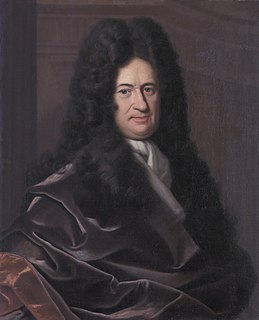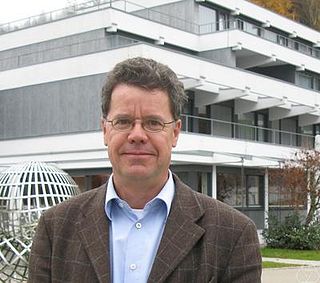Related Research Articles
In the philosophy of mathematics, intuitionism, or neointuitionism, is an approach where mathematics is considered to be purely the result of the constructive mental activity of humans rather than the discovery of fundamental principles claimed to exist in an objective reality. That is, logic and mathematics are not considered analytic activities wherein deep properties of objective reality are revealed and applied, but are instead considered the application of internally consistent methods used to realize more complex mental constructs, regardless of their possible independent existence in an objective reality.
Mathematical logic is the study of logic within mathematics. Major subareas include model theory, proof theory, set theory, and recursion theory. Research in mathematical logic commonly addresses the mathematical properties of formal systems of logic such as their expressive or deductive power. However, it can also include uses of logic to characterize correct mathematical reasoning or to establish foundations of mathematics.
In the philosophy of mathematics, constructivism asserts that it is necessary to find a specific example of a mathematical object in order to prove that an example exists. Contrastingly, in classical mathematics, one can prove the existence of a mathematical object without "finding" that object explicitly, by assuming its non-existence and then deriving a contradiction from that assumption. Such a proof by contradiction might be called non-constructive, and a constructivist might reject it. The constructive viewpoint involves a verificational interpretation of the existential quantifier, which is at odds with its classical interpretation.

The history of calculus is fraught with philosophical debates about the meaning and logical validity of fluxions or infinitesimal numbers. The standard way to resolve these debates is to define the operations of calculus using epsilon–delta procedures rather than infinitesimals. Nonstandard analysis instead reformulates the calculus using a logically rigorous notion of infinitesimal numbers.

In mathematics, the system of hyperreal numbers is a way of treating infinite and infinitesimal quantities. The hyperreals, or nonstandard reals, *R, are an extension of the real numbers R that contains numbers greater than anything of the form

In mathematics, an infinitesimal or infinitesimal number is a quantity that is closer to zero than any standard real number, but that is not zero. The word infinitesimal comes from a 17th-century Modern Latin coinage infinitesimus, which originally referred to the "infinity-th" item in a sequence.
Intuitionistic logic, sometimes more generally called constructive logic, refers to systems of symbolic logic that differ from the systems used for classical logic by more closely mirroring the notion of constructive proof. In particular, systems of intuitionistic logic do not include the law of the excluded middle and double negation elimination, which are fundamental inference rules in classical logic.
Foundations of mathematics is the study of the philosophical and logical and/or algorithmic basis of mathematics, or, in a broader sense, the mathematical investigation of what underlies the philosophical theories concerning the nature of mathematics. In this latter sense, the distinction between foundations of mathematics and philosophy of mathematics turns out to be quite vague. Foundations of mathematics can be conceived as the study of the basic mathematical concepts and how they form hierarchies of more complex structures and concepts, especially the fundamentally important structures that form the language of mathematics also called metamathematical concepts, with an eye to the philosophical aspects and the unity of mathematics. The search for foundations of mathematics is a central question of the philosophy of mathematics; the abstract nature of mathematical objects presents special philosophical challenges.
Proof theory is a major branch of mathematical logic that represents proofs as formal mathematical objects, facilitating their analysis by mathematical techniques. Proofs are typically presented as inductively-defined data structures such as plain lists, boxed lists, or trees, which are constructed according to the axioms and rules of inference of the logical system. Consequently, proof theory is syntactic in nature, in contrast to model theory, which is semantic in nature.
In mathematics, non-classical analysis is any system of analysis, other than classical real analysis, and complex, vector, tensor, etc., analysis based upon it.
In mathematical logic, in particular in model theory and nonstandard analysis, an internal set is a set that is a member of a model.
Smooth infinitesimal analysis is a modern reformulation of the calculus in terms of infinitesimals. Based on the ideas of F. W. Lawvere and employing the methods of category theory, it views all functions as being continuous and incapable of being expressed in terms of discrete entities. As a theory, it is a subset of synthetic differential geometry.
The term differential is used in calculus to refer to an infinitesimal change in some varying quantity. For example, if x is a variable, then a change in the value of x is often denoted Δx. The differential dx represents an infinitely small change in the variable x. The idea of an infinitely small or infinitely slow change is, intuitively, extremely useful, and there are a number of ways to make the notion mathematically precise.
In mathematical logic, realizability is a collection of methods in proof theory used to study constructive proofs and extract additional information from them. Formulas from a formal theory are "realized" by objects, known as "realizers", in a way that knowledge of the realizer gives knowledge about the truth of the formula. There are many variations of realizability; exactly which class of formulas is studied and which objects are realizers differ from one variation to another.
Nonstandard analysis and its offshoot, nonstandard calculus, have been criticized by several authors, notably Errett Bishop, Paul Halmos, and Alain Connes. These criticisms are analyzed below.
A timeline of mathematical logic. See also History of logic.

Izak (Ieke) Moerdijk is a Dutch mathematician, currently working at Utrecht University, who in 2012 won the Spinoza prize.
John Lane Bell is an Anglo-Canadian philosopher, mathematician and logician. He is Professor Emeritus of Philosophy at the University of Western Ontario in Canada. His research includes such topics as set theory, model theory, lattice theory, modal logic, quantum logic, constructive mathematics, type theory, topos theory, infinitesimal analysis, spacetime theory, and the philosophy of mathematics. He is the author of more than 70 articles and of 13 books. In 2009, he was elected a Fellow of the Royal Society of Canada.
This glossary of areas of mathematics is a list of sub-discliplines within pure and applied mathematics. Some entries are broad topics, like algebra, while others are narrower in scope, like convex geometry.
References
- Ieke Moerdijk, A model for intuitionistic nonstandard arithmetic, Annals of Pure and Applied Logic, vol. 73 (1995), pp. 37–51.
- "Abstract: This paper provides an explicit description of a model for intuitionistic nonstandard arithmetic, which can be formalized in a constructive metatheory without the axiom of choice."
- Erik Palmgren, Developments in Constructive Nonstandard Analysis, Bulletin of Symbolic Logic Volume 4, Number 3 (1998), 233–272.
- "Abstract: We develop a constructive version of nonstandard analysis, extending Bishop's constructive analysis with infinitesimal methods. ..."
- Juha Ruokolainen 2004, Constructive Nonstandard Analysis Without Actual Infinity
